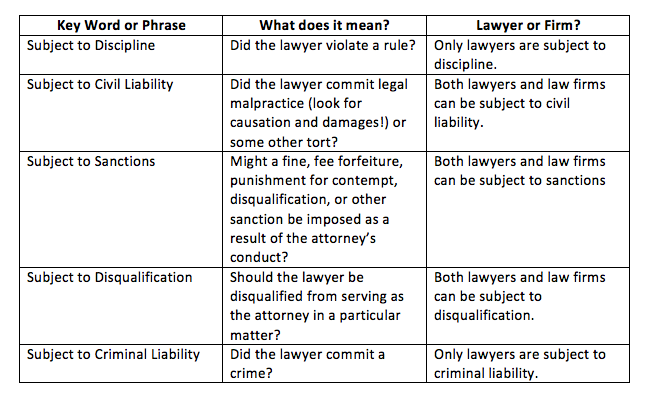How to Increase Your MPRE Score
How to Increase Your MPRE Score
How to Increase Your MPRE Score: If you aren’t scoring as high as you would like on your practice MPRE questions, or if you didn’t pass the MPRE and need to figure out how to get a higher score next time, we can help! In this post, we discuss some great ways to increase your MPRE score!
How to Increase Your MPRE Score
1. Understand the MPRE Key Words and Phrases.
You will see recurring keywords and phrases in the call of the question portion of the MPRE questions. Some questions might ask you whether a lawyer is “subject to discipline”. Other times, you may be asked whether an attorney’s conduct is “proper”. Knowing what these words and phrases mean and how to pick an appropriate answer choice will help you increase the number of questions you get correct!

2. Memorize the law.
It’s easy to think that you can figure out the answer to a multiple-choice question simply by reading through the answer choices and picking the one that makes the most sense. Or thinking that you will be able to figure out the answer to an MPRE question based on your “gut instinct” of what the outcome should be. However, the questions are intentionally designed to trick you and to play off these impulses! Many incorrect answer choices sound good or make sense, but they don’t accurately state the law and are therefore wrong!
Understanding and memorizing the applicable law is immeasurably helpful in increasing your MPRE score. Rather than just doing lots of practice questions, spend time doing other memorization exercises with the material that will help you remember it! Re-write your outline, make charts and diagrams, or quiz yourself on the material before you jump into practice questions to ensure that you are familiar with the material!
3. Focus on the highly tested material.
There are 12 sections of material covered on the MPRE, but each section is not tested equally. Spend more time focusing on the highly tested topics (e.g., Attorney-Client Confidentiality and Conflicts of Interest) than you spend on the less frequently tested topics (e.g., Judicial Conduct).
So, here is a breakdown of the approximate number of questions you will see on an MPRE test for each subject (based on a 60-question test):
- Regulation of the Legal Profession: 4-7 questions
- The Lawyer-Client Relationship: 6-10 questions
- Client Confidentiality: 4-7 questions
- Conflicts of Interest: 7-11 questions
- Competence, Legal Malpractice, and other Civil Liability: 4-7 questions
- Litigation and Other Forms of Advocacy: 6-10 questions
- Transactions and Communications with Persons Other Than Clients: 1-5 questions
- Different Roles of the Lawyer: 2-6 questions
- Safekeeping Funds and Other Property: 1-5 questions
- Communications About Legal Services: 2-6 questions
- Lawyers’ Duties to the Public and the Legal System: 1-3 questions
- Judicial Conduct: 1-5 questions
4. Practice with real MPRE questions.
Another great way to increase your MPRE score is to practice with actual questions! There are a lot of resources online for free MPRE practice questions. However, some questions will better prepare you for the actual test than others. For a full list of sources for practices questions, see this post.
You can find real, released MPRE Questions on the NCBE website. They offer a free 15 question practice quiz. If you would like to purchase MPRE questions, J.D. Advising has the available for purchase! Real questions will best prepare you for the format and style of the questions that you are likely to face on the actual MPRE!
5. Do practice questions slowly and methodically.
Many students try to fly through a set of practice questions just to score them quickly at the end and see if they were in the “passing” range. This is not the best technique. Instead, answer practice questions one at a time and slow down! As soon as you answer a question, check the answer to see if you got it right. Then read the answer explanation. If you got the question wrong, write down why you got it wrong! Maybe you didn’t know the law, or you missed a keyword in the fact pattern that changed the outcome. Either way, write it down!
As you study, keep track of why you are getting questions wrong. This will allow you to see what you need to spend more time studying and avoid making similar mistakes on future questions. Also, by writing down the correct law if you got a question wrong because you didn’t know the law, now you are working on memorizing the law the correct way!
6. Practice your timing!
Finally, no matter how well you know the law, it won’t do you much good if you run out of time and don’t finish the test! At least once before the actual exam, you should do a full practice test (60 questions in 2 hours). If you struggle to finish the practice test in 2 hours, make sure you practice timing as you do more practice questions (e.g., give yourself 2 minutes to answer 1 question or 10 minutes to answer 5 questions – try different increments of questions).
JD Advising’s FREE MPRE Course will cover not only more tips on how to study and practice for the MPRE, but also explanations of the substantive law, available in pre-recorded online lectures! You also get a copy of our excellent, comprehensive MPRE outline. It contains everything you need to know for the MPRE!
Looking to Ace the MPRE?
- Enroll in our 5-star rated free MPRE Course, complete with expert guidance, an exclusive outline, practice questions, and a one-sheet.
- Tackle the Real MPRE questions — the gold standard for test preparation.
- Elevate your preparation with personalized MPRE private tutoring, featuring a tailored study plan and dedicated MPRE outline.
- Dive into our assortment of complimentary top-notch MPRE resources for your success.






Leave a Reply
Want to join the discussion?Feel free to contribute!